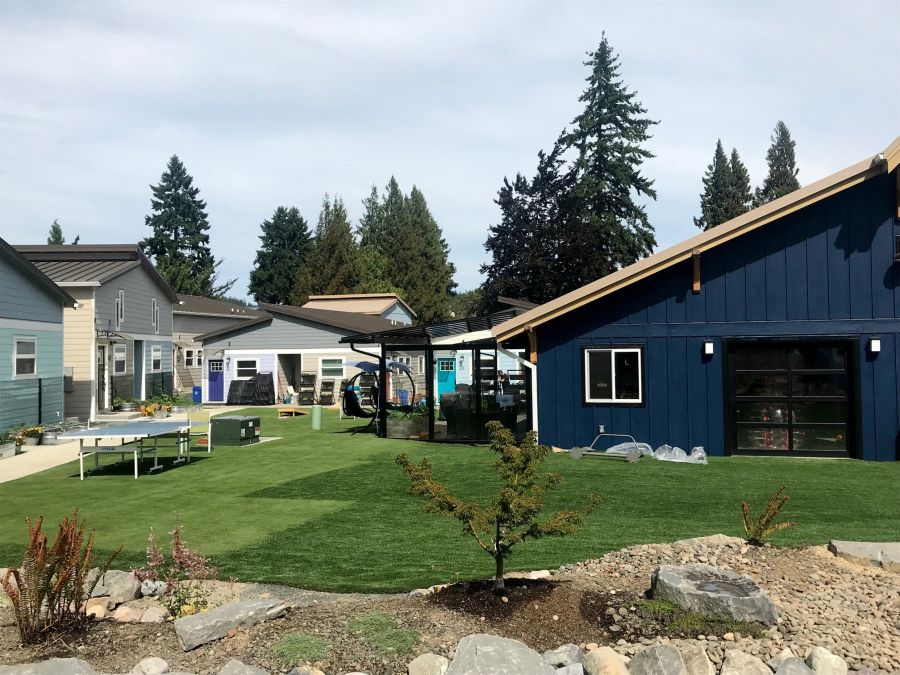The Vancouver-based Kuni Foundation, one of the largest charitable foundations in Southwest Washington, awarded $9.8 million to 15 nonprofits in Washington and Oregon during its latest round of grant giving.
The grants went to organizations that advance cancer research and provide affordable housing for people with intellectual and developmental disabilities, two issues central to the foundation’s ethos.
“We are committed to closing funding gaps that impact underserved communities and initiatives,” said Greg Brown, board chair of the Kuni Foundation and former CEO of Kuni Automotive. “These grants support bold new approaches to cancer research, address funding disparities for cancers impacting women and advance affordable housing for some of our community’s most vulnerable members.”
The funding comes at a critical moment, according to Kuni Foundation President Angela Hult.
Throughout the COVID-19 pandemic, cancer research took a back seat to vaccine development and other COVID-19 related research, Hult said. Plus, the pandemic’s disruption to routine checkups and screenings has led to an increase in people now being diagnosed with late-stage cancers.
“We absolutely have some catching up to do,” Hult said.
The pandemic also exacerbated the Northwest’s affordable housing crisis. More than 24,000 of the estimated 31,000 adults with intellectual and developmental disabilities in the Northwest are at risk of housing insecurity due to exclusion from planning processes, escalating housing costs and an unprecedented number of aging caregivers, according to a report released by the foundation in 2020.
“The affordable housing crisis is obviously off the charts right now,” Hult said. “And for people who experience an intellectual or developmental disability, it is magnified tremendously.”
Cancer research
Oregon Health & Science University received more than $3.3 million to support four efforts that seek to advance personalized cancer therapy, develop new strategies for breast cancer and resistant melanoma treatment, and amplify ovarian cancer research.
Funding will help OHSU researchers identify effective therapies for metastatic triple-negative breast cancer, which is roughly twice as common in African American and Hispanic women, Hult said. Researchers are also focused on new treatments for melanoma that could potentially be applied to other cancers.
New treatments for melanoma would have local impact: Oregon and Washington have higher rates of melanoma than the national average, including a prevalence of late-stage diagnosis and poorer outcomes in rural areas, according to Hult.
“Grants this cycle have elements of increasing that accessibility, increasing that access to screenings and that access to treatment,” Hult said.
UW Medicine also received more than $3.3 million for four projects aimed at exploring new cancer therapies and improving patient outcomes and access.
“These generous grants to UW Medicine researchers fund a spectrum of research — from pioneering, innovative treatment to testing new protocols to reduce patient financial burden — which will ultimately make cancer care more equitable and effective,” said Paul G. Ramsey, CEO of UW Medicine.
Other cancer research organizations that received grants include the Providence Cancer Institute ($400,000) and the Fred Hutchinson Cancer Research Center ($750,000).
“On top of improving accessibility to treatment, we’re also looking at what I call underserved or underfunded cancers,” Hult said. “These are areas of research where we haven’t seen a lot of innovation in 30 to 40 years. And so, wherever we can lean in with funding and kind of be a catalyst in supporting the researchers in getting more attention or getting better results, that’s what we get really excited about.”
Affordable housing
Five grants were awarded to organizations working toward addressing the affordable housing crisis for people with intellectual and developmental disabilities.
The Beaverton, Ore.-based Edwards Center received $300,000 to help complete a housing model that will allow adults with intellectual and developmental disabilities and their parents to live together in a small community, where they can age in place while receiving support and social connection.
The Seattle-based program Ryther received $876,000 to help the program utilize peer mentors to connect people with intellectual and developmental disabilities to services.
Other grants include $300,000 awarded to a statewide advocacy effort led by The Arc of Washington State, Disability Rights Washington and Allies in Advocacy, and $300,000 awarded to Community Homes to expand an inclusive housing community in Shoreline.
“We’re so excited by the work of all the partners we have the opportunity to support,” Hult said. “They’re having an impact in so many important ways. For us, it’s always an honor to support that work and to partner with people who are doing so much good in the community during a very challenging time.”





